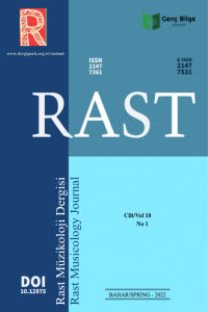Non-native English teachers’ views on the use of music and songs in teaching English as a foreign language to primary school learners
Music, Song, English teaching, Young learners (YLs), songs, foreign language
Non-native English teachers’ views on the use of music and songs in teaching English as a foreign language to primary school learners
Music, English teaching, Young learners (YLs), songs, foreign language,
___
- 1. Arévalo, E. (2010). The use of songs as a tool to work on listening and culture in EFL classes. Cuadernos de Lingüística Hispánica, 15, 121–138. https://www.redalyc.org/pdf/3222/322227521008.pdf
- 2. Dolean, D. D. (2016). The effects of teaching songs during foreign language classes on students’ foreign language anxiety. Language Teaching Research, 20(5), 638-653. https://doi.org/10.1177/1362168815606151
- 3. Dolean, D. D., & Dolean, I. (2014). The Impact of Teaching Songs on Foreign Language Classroom Anxiety. Philologica Jassyensia, 10, 513-518.
- 4. Cameron, L. (2001). Teaching languages to young learners. Cambridge: Cambridge University Press.
- 5. Edden, J. (1998). Language and Music in Bearne, Eve. (Ed.) Use of Language Across the Primary Curriculum. Florence, KY, USA: Routledge.
- 6. Engh, D. (2013a). Effective use of music in language-learning: A needs analysis. Humanising Language Teaching, 15(5), 1-9. https://www.academia.edu/8652569/Effective_Use_of_Music_in_Language_Learning_A_Needs_Analysis?auto=download
- 7. Fraenkel, J. R. & Wallen, E. N. (2009). How to Design and Evaluate Research in Education: Seventh Edition. New York: McGraw-Hill.
- 8. Futonge, K. (2005). Using English Videos and Music in EFL, ESL Classrooms. ESL Magazine: Read & Publish ESL articles.
- 9. Johnstone, R. (2002). Addressing ‘the age factor’: Some implications for languages policy. Strasburg, France: Council of Europe.
- 10. Keskin, F. (2011). Using songs as audio materials in teaching Turkish as a foreign language. Turkish Online Journal of Educational Technology, 10(4), 378-383. https://files.eric.ed.gov/fulltext/EJ946647.pdf
- 11. Kuśnierek, A. (2016). The role of music and songs in teaching English vocabulary to students. World Scientific News, 43(1),43-48. http://www.worldscientificnews.com/wp-content/uploads/2015/10/WSN-431-2016-1-55.pdf
- 12. Lo, R. & Li, H.C. (1998). Songs enhance learner involvement. English Teaching Forum, 36(3), 8-11.
- 13. Lodico, Marguerite G., Spaulding, Dean T & Voegtle, Katherine H. (2005). Methods in Educational Research. US: A willey Imprint.
- 14. Maess, B. & Koelsch. S. Gunter, C. Th. Friederici, D. A. (2001). Musical Syntax is processed in Broca’s Area: An MEG study. Nature Nevroscience, 4(5), 540-545. DOI https://doi.org/10.1038/87502
- 15. McDermott, J. & Hauser, D. M. (2005). The origins of music: Innateness, uniqueness, and evolution. Music Perception, 23(1), 29-59. https://doi.org/10.1525/mp.2005.23.1.29
- 16. Medina, S. L. (1990). The Effects of Music upon Second Language Vocabulary Acquisition. Paper presented at the Annual Meeting of the Teachers of English to Speakers of Other Languages conference, US: San Francisco. https://files.eric.ed.gov/fulltext/ED352834.pdf
- 17. Murphey, T. (1992). Music and song. Oxford: Oxford University Press.
- 18. Pearl, G. (1995). Janacek’s Moravian folk songs: A prosodic analysis. U-Web Students Web Service. http://www.uweb.ucsb.edu/~jpearl/Janacek.html
- 19. Pérez, M. (2013). Songs as a tool to develop listening and speaking skills at a beginners' level. (Master’s thesis, Universidad Veracruzana, Veracruz, Mexico). Retrieved from http://cdigital.uv.mx/bitstream/123456789/34271/1/munozperezingrid.pdf
- 20. Ratnasari, H. (2007). Songs to improve the students’ achievement in pronunciation English words (Master’s thesis, Semarang State University, Semarang, Indonesia). Retrieved from http://lib.unnes.ac.id/1064/1/1980.pdf
- 21. Rusadze, I. (2018). Songs Enhance Students Involvement. Conference: 5th International Research Conference (IRCELT). Kutaisi, Georgia. https://www.researchgate.net/publication/326262723_Songs_Enhance_Students_Involvement
- 22. Saricoban, A. & Metin, E. (2000). Songs, verse and games for teaching grammar. The Internet TESL Journal, 6(10), http://iteslj.org/Techniques/Saricoban-Songs.html
- 23. Stansell, J. (2005). The use of music for learning language: A review. University of Illinois at Urbana-Champaign. Retrieved from http://writingthetrueself.com/pdfs/Jon_Stansell_The_Use_of_Music_for_Learning_Languages.pdf
- 24. Tse, A. Y. (2015). Malaysian teachers’ perspectives on using songs in English language teaching. International Journal of Social Science and Humanity, 5(1), 87-89. http://www.ijssh.org/papers/428-H10021.pdf
- 25. Wolfe, D. E., & Noguchi, L. K. (2009). The use of music with young children to improve sustained attention during a vigilance task in the presence of auditory distractions. Journal of Music Therapy, 46(1), 69-82. https://doi.org/10.1093/jmt/46.1.69
- ISSN: 2147-7361
- Yayın Aralığı: Yılda 4 Sayı
- Başlangıç: 2013
- Yayıncı: Genç Bilge Yayıncılık (Young Wise)
The Effect of Playing Instrument on Voice Training
V.R.'nin “Game” şarkısının taslak versiyonlarında özne-nesne ilişkileri kavramı. Tsoy
Çocuğun sosyalleşme süreci olarak yaratıcı sanatsal ve müzikal etkinliği
Irina Vladimirovna WAGNER, Ekaterina Mikhailovna AKİSHİNA, Elena Petrovna OLESİNA
Meslek yüksek okulu öğrencilerinin ruhsal durum algıları ile müzik tercihlerinin incelenmesi
Gonca SOYSAL, N. Fikri SOYSAL, Elçin BALCI
Shqipe AVDIU-KRYEZİU, Arsim AVDİU
Balina Şarkısı: Kambur Balina Megaptera Novaeangliae Kültürlerinde Müzikal Pratikler
Preludes and fugues for piano in the polyphonic works of Chinese composers
Marianna CHERNYAVSKA, Mengzhe ZHANG
Vokalist mi yoksa oyuncu mu: Müzikal tiyatro türünde hangisi daha iyi performans göstermeye hazır?
Marina KRUGLOVA, Anna SHCHERBAKOVA, Aigul GAREEVA, Alexander VASİLENKO
V.R.'nin “Game” şarkısının taslak versiyonlarında özne-nesne ilişkileri kavramı. Tsoy
